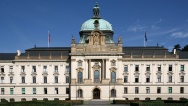Press Advisories
12. 2. 2009 9:40
J. M. Barroso: It is possible to overcome this difficult situation
People and businesses all across the EU and the world face tough times. There is no magic fix to the crisis we are going through. It did not happen overnight. It will take time to fix it. But we can fix it. We have learnt the lessons of dealing with past crisis situations. We have given ourselves institutions, instruments and policies to meet this kind of challenge. Using the strength of a European approach, using the strength of coordination among our 27 Member European Union, using the strength of our Internal Market, of the Euro , we can ensure that we emerge from this crisis in better shape, ready to take full advantage of the upturn.
At a time of crisis some think that retrenching within their own group, their own region, their own country is the right response. But this carries the risk of unilateral reactions leading to a vicious downward spiral. We have gone through such unhappy experiences in the past. And that is why we must now safeguard against their repetition. This is the raison d'être of the European Union, a common European approach. We must co-ordinate our actions to maximise the benefits for all, and not have negative side effects for our neighbours. Which is why we, the Czech Presidency and the Commission, have defined an ambitious and proactive approach for the management of the challenges ahead of us: a roadmap of initiatives for economic and financial market recovery that stretches to the Spring European Council, the G 20 Summit in April in London and also beyond it.
Our meeting this week marks the start of the countdown towards the Spring Council and towards the G 20 Summit. Solidarity and coherence of EU action are more necessary than ever. Today we held a working meeting between the Commission and the Presidency of the Council. I'd like to thank especially my good friend Mirek Topolánek for coming here to Brussels. We had not only a bilateral meeting, but also Prime Minister Topolánek discussed with the whole College some of the priorities of the Czech Presidency, some of the work we are also developing in the Commission and it was indeed a very useful meeting because we could agree on some concrete steps forward.
And that is why I'm going to present to you very briefly what we have decided, on the Commission's side. Of course Prime Minister Topolánek will elaborate on the Presidency's side.
On the Commission’s work and tasks:
On 18 February, we will present our assessment of many of the revised stability and convergence programmes of the Member States. The remainder of the assessment of the programmes will be completed by the end of the month. In applying the Stability and Growth Pact, and the flexibility it offers, we will give a clear message that short term economic stimulus and medium term fiscal stability can and must go hand in hand.
Afterwards but that's up to the Presidency to present, there will be an informal meeting of Heads of State and Government. We will come later to this point.
On 25 February, I will receive from Mr de Larosière the recommendations of the high level group he chairs on the future supervision of the financial sector in the EU. These will help us to develop our proposals for shaping global financial markets and will play an important part in restoring confidence and preventing crises in the future. They will build on work which is already underway. As you know, in addition to the initiatives already presented last autumn, we will be coming forward with initiatives on executive pay, hedge funds and private equity.
On 4 March the Commission will adopt its contribution to the Spring European Council. This contribution will address the whole range of economic and financial issues. It will notably include our first reaction to the de Larosière report. It will also focus on the issue of employment. On this basis we hope the European Council will take important decisions on 19/20 March.
We will also pursue the EU dimension of the European Recovery Plan. As you know, we have proposed to devote 5 billion euros of unspent money from the Community budget to key investments in energy inter-connectors, in carbon capture and storage and in promoting broadband in rural areas. Committing to these investments will boost the economy whilst at the same time laying the ground for a more future proof internal market for energy and communication.
In parallel, the Commission is already working with Member States to re-programme the European Social Fund to help keep people in employment. We need their skills and talents to get the economy growing again. The Commission will also work with Member States to develop support packages to accompany restructuring and help those who lose their jobs to retrain and find new employment. It will also work to reduce the broader social impact of the crisis and support vulnerable populations across the EU. In this respect, we will make use of the full potential of the instruments at our disposal, including the Globalization Adjustment Fund.
Finally, already at this stage, we need to look beyond the Spring Council and the G 20 Summit ourselves on the course for the next steps. As you know, we are going to have an informal meeting in Berlin on 22 February, of those that are going to participate in the G20, the European members, so that we can start the process of building a real European position for the G20 summit in London, but also we believe it is important to look at the social aspects and this is indeed our first concern now. It is clear that everything we do is ultimately aimed at preserving the wellbeing of citizens. This means preserving their jobs wherever possible and securing the employability of our workers. However, there is usually a lag between the onset of recession and an increase in the number of jobs lost. We do not yet have the full picture of the employment situation. Therefore, we have agreed today that – I am grateful for the position of Prime Minister Topolánek - the Czech Presidency will call a special meeting of the European Council in May to focus on the jobs situation – a Jobs and Social Summit. In fact, I have invited the social partners to join the weekly Commission meeting on 25 February to help us prepare proposals for this meeting. We will discuss this in more detail at the Spring Council and develop a new employment plan for the EU.
I want to say to citizens that we are very much aware of the uncertainties and hardships they are facing. We are here to address their concerns and to act in their interest. This is the way forward. We must now move on with speed, confidence and determination. We believe it is possible to overcome this difficult situation. One thing is important not to add to the difficulties of the situation by creating other problems coming from the reaction to the situation.
We should concentrate on the very important decisions that were already taken by the EU. Let me tell you that the EU dimension of the Recovery plan is indeed impressive. If we count all the elements of the fiscal stimulus, we will come for these 2 years, to an amount of around 600 billion euros. In fact, regarding the action of the Member States we expect that the size of the fiscal stimulus agreed under the European Recovery Plan and of the automatic stabilisers already in place to be clearly above 3 %, our estimation is that they are at least 3,3% over 2009 and 2010. And if we add to this, the recapitalisation, the injection of capitals in the banks, we are already at a figure of 600 billion euros for these 2 years. This shows of course the importance of decisions taken so far and we cannot expect them to produce effects immediately. What we have to do now is to concentrate on their implementation and also in some cases of course to work further for some areas. As we have discussed on Monday, we are also working on the issue of impaired assets. I was in the Eurogroup meeting, meeting of the ministers of finance of the Euro area and, as you know, there is work going on regarding impaired assets and the Commission will put forward, before the informal meeting of Heads of State and government, guidelines for dealing with impaired assets in the banks of the EU.
So this is just to give a general framework of what we are doing and I believe that we should now concentrate on the implementation of the very important decisions taken so far.






